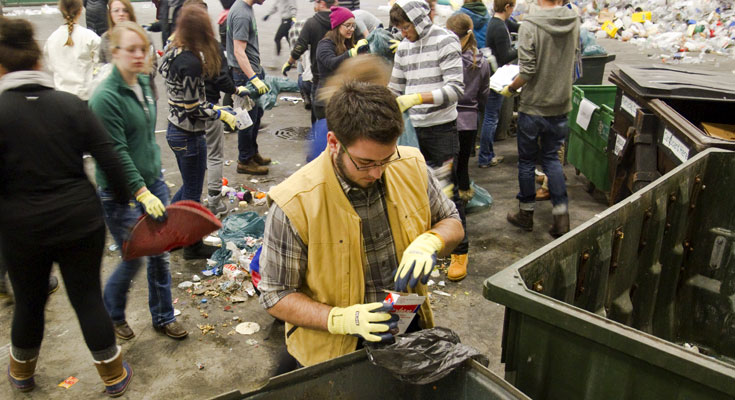Diving into sustainability: Students analyze MSU's waste stream
Michigan State University's Department of Community Sustainability's CSUS 200 course, Introduction to Sustainability, is often the first stop for MSU students interested in subjects like environmental stewardship, waste reduction and clean energy. The course provides students with the opportunity to learn about the principles of sustainability and how their actions can make a difference. For two of the four classes taught each semester, that learning experience includes partnering with MSU's Recycling Center team to conduct a hands-on waste audit of a campus building.
Designed to measure the amount of recyclable and organic material that ends up in the waste stream, waste sorts provide key information that helps the recycling team improve their services. Each building reveals unique results about what materials are being diverted through recycling or composting and what materials are being sent to the landfill. Thus far, the results show that plastic, paper and organic items are the most common divertible material that end up in the waste stream.

"The point of the waste audits is ultimately to develop more building-specific guidelines for recycling that will help reduce the amount of material that ends up the landfill," said Dave Smith, Recycling Coordinator at MSU Recycling, "we want to divert as much material as possible, and to do that we strive to make improvements based on the information gained in each unique waste sort."
For CSUS 200 students, participating in these waste sorts not only provides an accurate depiction of the campus waste-stream, but it also helps reinforce the principles of responsibility and stewardship that originally drew them to the course.
"It's really eye-opening for most people," said Brad Kurzynowski, Student Recycling Coordinator at MSU's Recycling Center, "these waste audits help students understand the magnitude of the waste issue and encourage them not to contribute to a culture of waste through their personal practices."
Many students in CSUS 200 have adopted an environmentally-focused mindset already, but this project proves that everyone is still learning.
"Even sustainably-minded people can get stuck viewing material through a cliché lens, where 'recyclable' only refers to common items like water bottles and office paper. Waste sorts allow students a hands-on opportunity to learn the expansive and more obscure recycling tactics so they are better prepared to lead by example," said Emmalena Verellen, Student Recycling Coordinator.
The hope moving forward is to spread education and awareness across campus so that students, faculty and staff are better-equipped to properly recycle and divert waste from the landfill. For the MSU Recycling team, this means using the data to improve signage and outreach materials catered to specific buildings. For CSUS 200 students, it means applying their experience to their studies and daily lives as they pursue a future as sustainable leaders.

